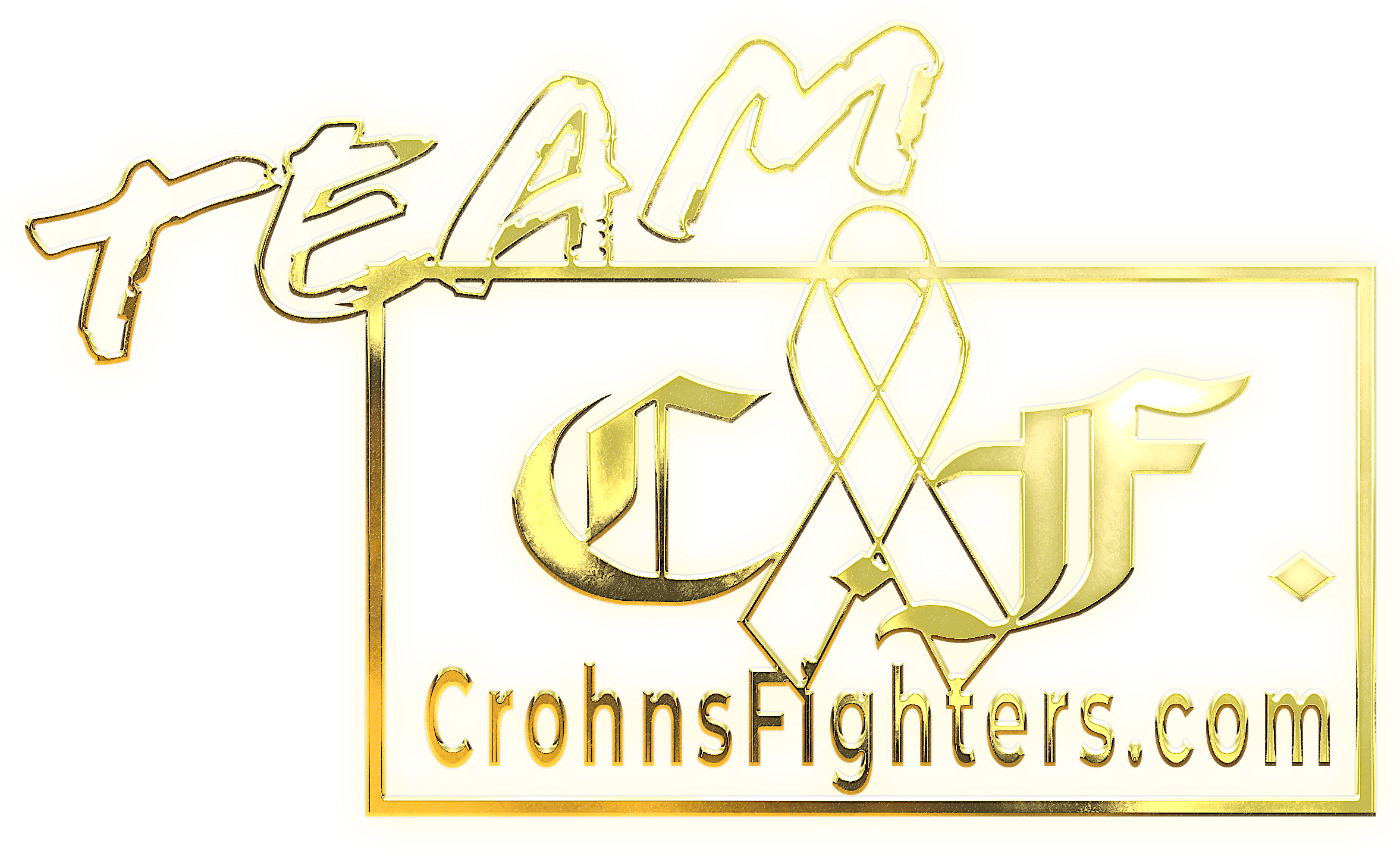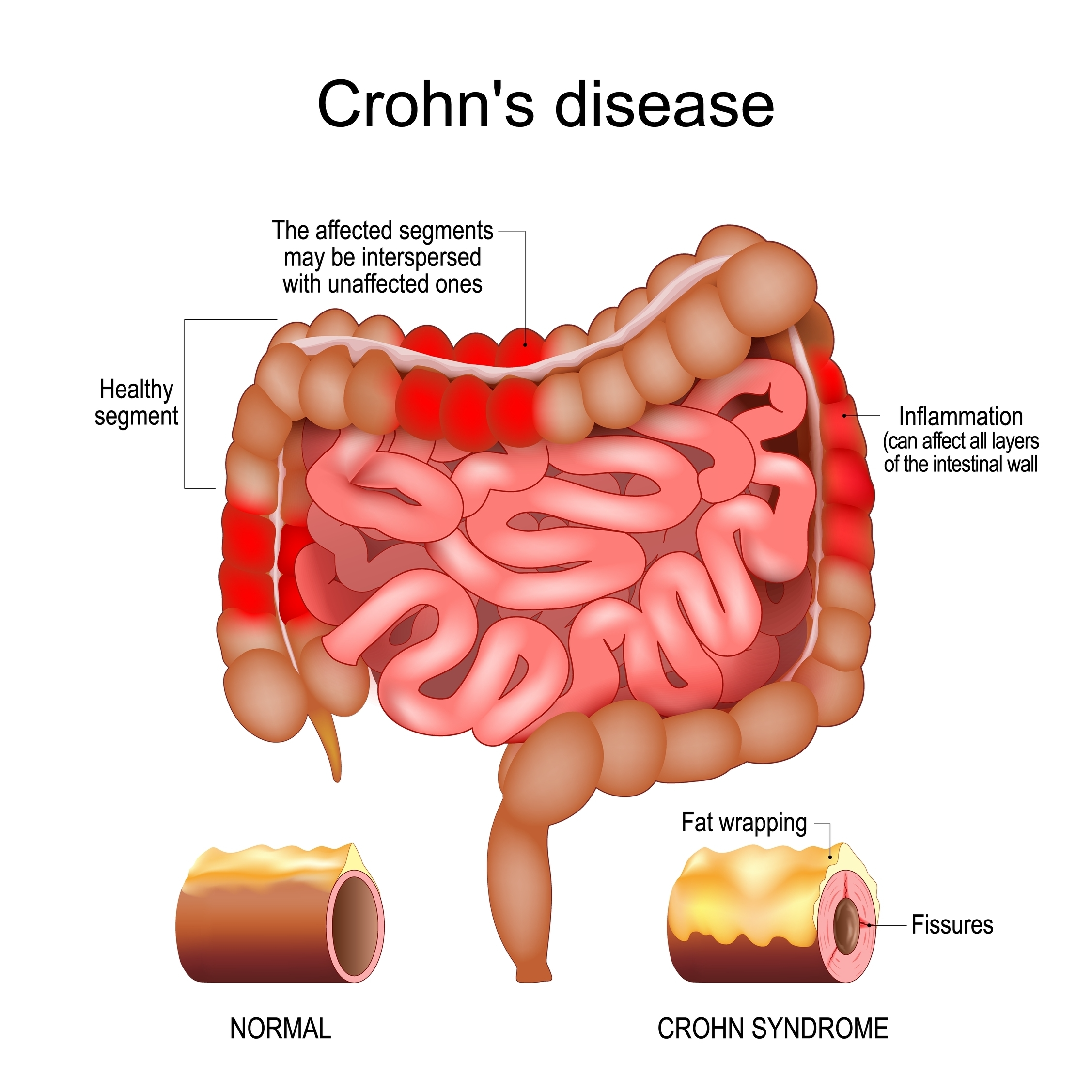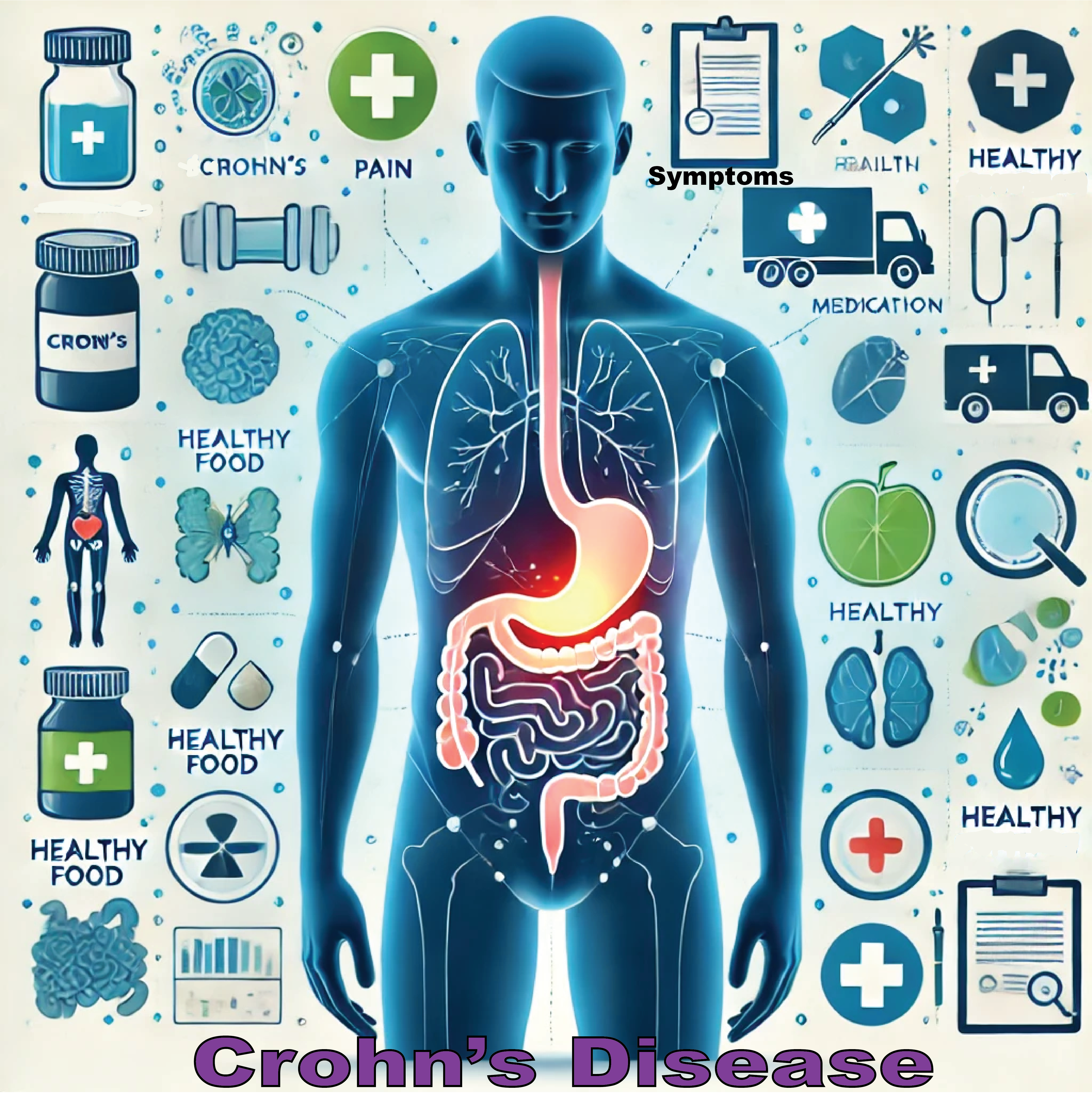Understanding of Crohn’s
IBD- Inflammatory bowel disease (IBD) is a term used to encompass disorders involving chronic intestinal inflammation. These conditions are typically classified as either Crohn’s disease or ulcerative colitis based on clinical features, colonoscopy findings, histologic changes, and the anatomical distribution of disease. In some cases, however, overlapping features are noted.
Ulcerative colitis- A chronic disease of the large intestine, in which the lining of the colon becomes inflamed and develops tiny open sores, or ulcers. This condition is the result of your immune system’s overactive response.
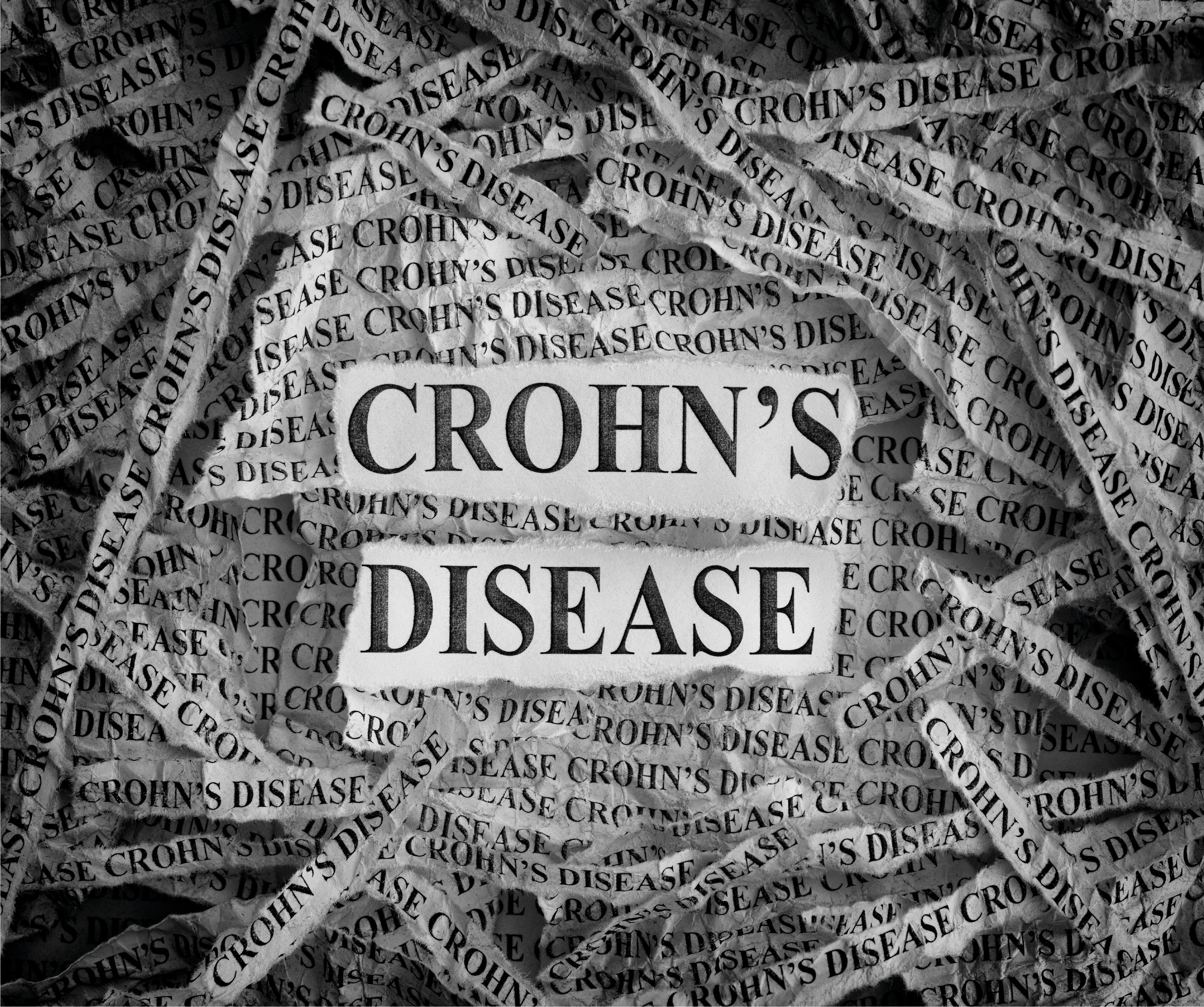
Get Informed About Symptoms, Causes, and Treatments
Living with Crohn's
SYMPTOMS & DIAGNOSIS
Common symptoms of Crohn’s disease include persistent diarrhea, abdominal pain, and cramping, often accompanied by fatigue, weight loss, and reduced appetite. Some people may also experience fever, anemia, and joint pain. Less common symptoms can include inflammation of the eyes, skin disorders, and delayed growth in children. Additionally, patients may experience mouth sores, blood in the stool, and severe cases of constipation due to intestinal obstruction.
Diagnosis typically involves a combination of tests. Blood tests can check for signs of inflammation, anemia, and nutritional deficiencies. Stool tests help rule out infections and identify signs of bleeding or inflammation in the intestines. Imaging studies, such as CT scans, MRI, or small bowel follow-through, provide detailed images of the digestive tract to detect areas of inflammation, blockages, or other abnormalities.
Endoscopic procedures play a crucial role in diagnosing Crohn’s disease. Colonoscopy or sigmoidoscopy allows doctors to directly visualize the colon and terminal ileum, where Crohn’s disease commonly manifests. During these procedures, doctors can take tissue samples (biopsies) to look for microscopic signs of inflammation and other characteristic changes. Capsule endoscopy, where the patient swallows a small camera that takes pictures throughout the digestive tract, can be particularly useful for examining the small intestine, which is harder to reach with standard endoscopy.
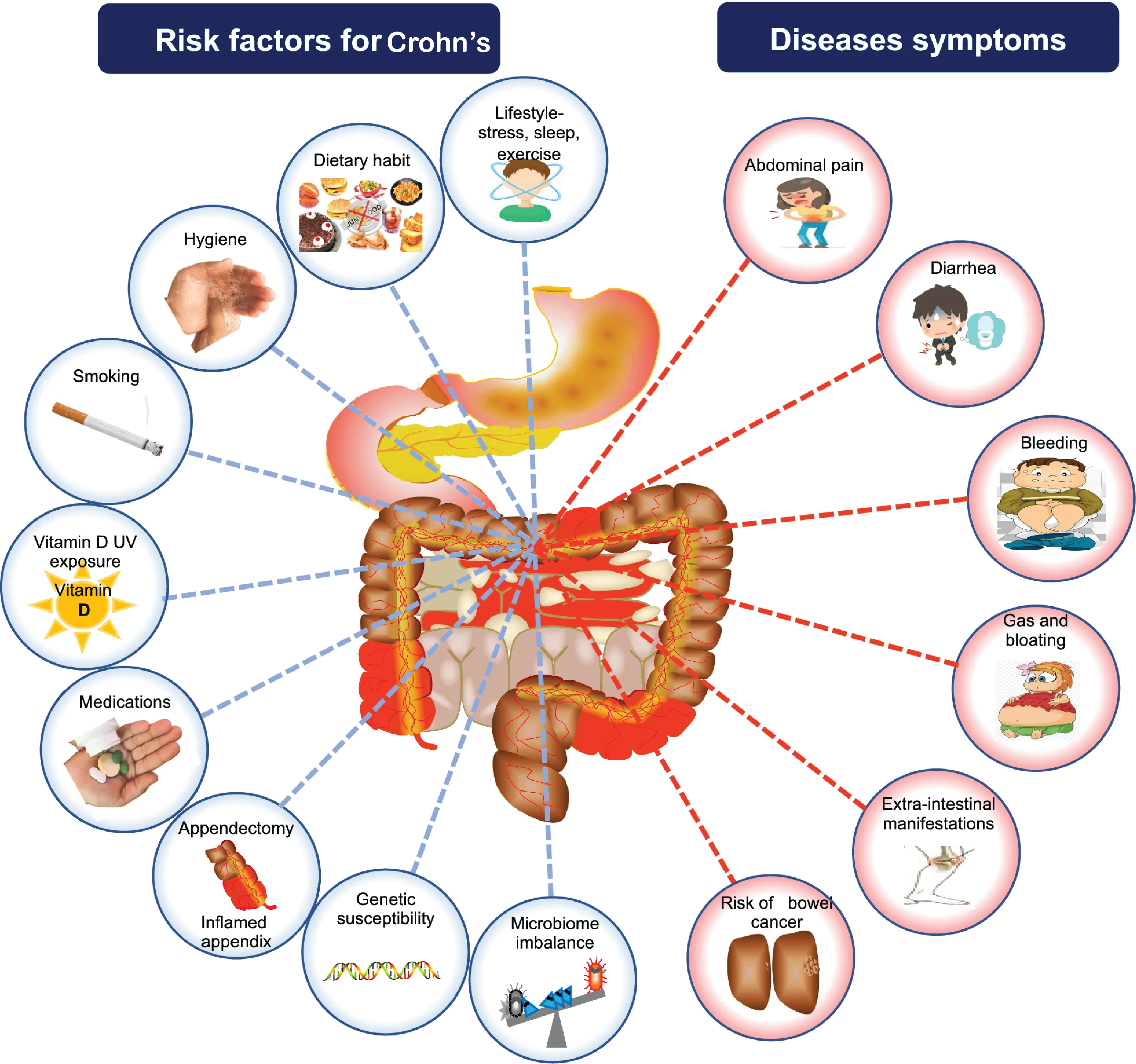
CAUSES & RISK FACTORS
Living with Crohn's
TREATMENT OPTIONS
Crohn’s disease treatment focuses on reducing inflammation, managing symptoms, and achieving long-term remission. Options include medications like anti-inflammatory drugs (such as aminosalicylates and corticosteroids) to reduce intestinal inflammation. Immune system suppressors (such as azathioprine, methotrexate, and cyclosporine) help control the immune response that contributes to inflammation. Biologics (such as infliximab, adalimumab, and ustekinumab) target specific components of the immune system to reduce inflammation and are often used for moderate to severe cases.
Nutritional therapy and dietary changes can also play a crucial role in managing symptoms and improving overall health. This may involve using special diets, such as an elemental diet or enteral nutrition, to allow the intestines to rest and heal. Identifying and avoiding trigger foods, such as high-fiber foods, dairy products, and certain carbohydrates, can help reduce symptoms.
In severe cases, surgery may be necessary to remove damaged portions of the intestine, address complications like strictures or fistulas, or treat areas that do not respond to medication. Surgical options can include resection (removal of a diseased segment of the intestine) and strictureplasty (widening of a narrowed section of the intestine). While surgery can provide significant relief, it is not a cure, and the disease may recur in other parts of the digestive tract.
Regular monitoring and working closely with healthcare providers are essential to ensure the most effective treatment plan. This includes routine check-ups, lab tests, and imaging studies to assess disease activity and adjust treatments as needed. Additionally, integrating complementary therapies, such as stress management techniques, physical activity, and support groups, can enhance overall well-being and help patients cope with the challenges of living with Crohn’s disease. Educating patients about the various treatment options and encouraging a proactive approach to managing their condition can lead to better outcomes and improved quality of life
MICHAEL JANNICELLI Living with Crohn's
LIVING WITH CROHN'S
Living with Crohn’s disease requires a comprehensive approach to manage symptoms and maintain a good quality of life. By understanding your condition, working closely with healthcare providers, and making necessary lifestyle adjustments, you can effectively manage your symptoms and lead an active life. Explore our resources to learn more about treatment options, dietary recommendations, and support systems available to help you navigate life with Crohn’s disease.
Crohn's Fighters
potential complications
Crohn’s disease can lead to various complications if not effectively managed. Intestinal complications include strictures (narrowing of the intestines), fistulas (abnormal connections between different parts of the intestine or between the intestine and other organs), and abscesses (pockets of infection). Severe inflammation can cause bowel obstructions, requiring emergency surgery. Nutritional deficiencies, due to malabsorption of nutrients, are also common and can result in anemia, osteoporosis, and growth delays in children. Extra-intestinal complications may include arthritis, skin disorders, eye inflammation, and liver disease. Long-term inflammation increases the risk of colorectal cancer. Regular monitoring, early detection, and proactive management are crucial to prevent and address these complications, ensuring better health outcomes and quality of life for individuals with Crohn’s disease.
Resources and Support Section
At Crohn’s Fighters, we offer a variety of resources and support options to help you navigate life with Crohn’s disease. Our educational materials include comprehensive guides on disease management, covering topics such as understanding your diagnosis, medication options, dietary adjustments, and coping strategies for daily life. We provide access to the latest research and advancements in Crohn’s disease treatment and management, ensuring you stay informed about new therapies, clinical trials, and cutting-edge scientific discoveries.
Our support groups, both online and in-person, offer a safe and welcoming space to share experiences, ask questions, and receive emotional support from others who truly understand your journey. These groups are facilitated by experienced moderators and often feature guest speakers, such as gastroenterologists, nutritionists, and mental health professionals, who can provide expert advice and insights.
In addition to support groups, we host regular webinars and workshops on various aspects of living with Crohn’s disease. These sessions cover topics such as managing stress and anxiety, navigating health insurance and financial assistance, and tips for maintaining a balanced lifestyle. Our events also include Q&A sessions, allowing you to directly interact with healthcare professionals and get your specific questions answered.
By joining our community, you can connect with fellow patients, caregivers, and advocates, fostering a sense of belonging and mutual support. We also offer one-on-one peer mentoring, where you can be matched with someone who has similar experiences and can provide personalized guidance and encouragement. Furthermore, our resource library includes downloadable materials, such as meal plans, symptom trackers, and checklists for medical appointments, to help you manage your condition more effectively.
Whether you are newly diagnosed or have been managing Crohn’s for years, Crohn’s Fighters is here to support you every step of the way. Our goal is to empower you with knowledge, connect you with a supportive community, and provide the tools you need to live a fulfilling and healthy life despite the challenges of Crohn’s disease.
POTENTIAL COMPLICATIONS
At Crohn’s Fighters, we offer a variety of resources and support options to help you navigate life with Crohn’s disease. Our educational materials include comprehensive guides on disease management, covering topics such as understanding your diagnosis, medication options, dietary adjustments, and coping strategies for daily life. We provide access to the latest research and advancements in Crohn’s disease treatment and management, ensuring you stay informed about new therapies, clinical trials, and cutting-edge scientific discoveries.
Our support groups, both online and in-person, offer a safe and welcoming space to share experiences, ask questions, and receive emotional support from others who truly understand your journey. These groups are facilitated by experienced moderators and often feature guest speakers, such as gastroenterologists, nutritionists, and mental health professionals, who can provide expert advice and insights.
In addition to support groups, we host regular webinars and workshops on various aspects of living with Crohn’s disease. These sessions cover topics such as managing stress and anxiety, navigating health insurance and financial assistance, and tips for maintaining a balanced lifestyle. Our events also include Q&A sessions, allowing you to directly interact with healthcare professionals and get your specific questions answered.
By joining our community, you can connect with fellow patients, caregivers, and advocates, fostering a sense of belonging and mutual support. We also offer one-on-one peer mentoring, where you can be matched with someone who has similar experiences and can provide personalized guidance and encouragement. Furthermore, our resource library includes downloadable materials, such as meal plans, symptom trackers, and checklists for medical appointments, to help you manage your condition more effectively.
Whether you are newly diagnosed or have been managing Crohn’s for years, Crohn’s Fighters is here to support you every step of the way. Our goal is to empower you with knowledge, connect you with a supportive community, and provide the tools you need to live a fulfilling and healthy life despite the challenges of Crohn’s disease.
Your Title Goes Here
Your content goes here. Edit or remove this text inline or in the module Content settings. You can also style every aspect of this content in the module Design settings and even apply custom CSS to this text in the module Advanced settings.
What are Alternative options
Lorem ipsum dolor sit amet, consectetuer adipiscing elit. Phasellus hendrerit.
